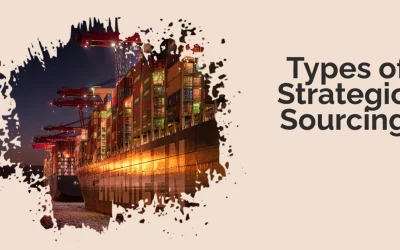Are you looking for ways to reduce costs and increase efficiency in your business? Global sourcing may be the answer you’re looking for. Global sourcing refers to the practice of purchasing raw materials, goods, and services from suppliers worldwide to achieve cost-effectiveness and cost-efficiency in procurement.
In this article, we’ll take a closer look at global sourcing, its advantages, and how to implement a global sourcing strategy in your business successfully. So whether you’re just starting to explore the benefits of global sourcing or are looking to fine-tune your existing procurement process, this article has something for you.
So keep reading to learn more about how global sourcing can help your business thrive in today’s competitive global market.
Understand the Benefits of Global Sourcing
Global sourcing refers to purchasing raw materials, goods, and services from suppliers worldwide to achieve cost-effectiveness and cost-efficiency in procurement. It involves the development of a procurement strategy that considers the global supply of materials, goods, and services and seeks to identify the most cost-effective and reliable sources of these items.
One of the main advantages of global sourcing is the ability to access lower-cost suppliers, who may be located in countries with lower labour and production costs. For example, many companies outsource certain operations, such as call centres, to countries like India, Pakistan, and the Philippines to take advantage of lower labour costs and other cost-saving opportunities.
In addition to lower costs, global sourcing can offer several other benefits, including access to a broader range of suppliers, the ability to take advantage of tax breaks and other incentives offered by different countries, and the opportunity to tap into new markets and customer bases.
However, global sourcing also carries certain risks, such as the potential for intellectual property theft and the challenges of managing a global supply chain across geopolitical boundaries.
To successfully implement a global sourcing strategy, it is vital for companies to carefully evaluate the potential advantages and risks of sourcing materials, goods, and services from different countries and to develop a centralized procurement process that allows for the efficient management of the global supply chain.
By carefully considering these factors, companies can take advantage of the many benefits of global sourcing, including lower costs and increased efficiency, while mitigating potential risks.
Conduct Thorough Research
It is essential to conduct thorough research before committing to any supplier. Research should include an in-depth analysis of the specific product or service you are sourcing, the international market, the suppliers available, and their respective capabilities.
In addition, consider geographical, economic, and legal factors affecting your sourcing decisions. For example, researching potential suppliers can help you find the right partner that fits your needs and budget.
Additionally, it is crucial to consider any potential risks associated with cross-border businesses, such as customs regulations, language barriers, and cultural differences. Understanding these factors will help you make informed decisions and ensure a successful global sourcing process.
Develop a Sourcing Strategy
The first step in developing a global sourcing strategy is understanding precisely what you need. This means researching potential suppliers, evaluating their capabilities, and deciding if they can provide the goods and services you require.
You’ll also want to consider cultural differences between your business and the supplier, costs, quality control measures, and logistics. Additionally, keep an eye on the long-term sustainability of the partnership so it can be maintained over time. With the right strategy in place, global sourcing can be a powerful tool for businesses looking to maximize their resources cost-effectively.
Evaluate Suppliers
When evaluating potential suppliers, it’s essential to consider their capabilities and industry experience. Make sure you thoroughly research the supplier and its background.
Take the time to get to know their production processes, quality assurance measures, and their commitment to customer service. Additionally, explore their financial stability and reputation in the industry. Finally, ask for references and customer reviews, and visit them in person to ensure they fit your sourcing needs. Remember, when it comes to global sourcing, it’s essential to make sure you choose a capable and reliable partner.
Negotiate Contracts
Negotiating contracts is an integral part of global sourcing and can be daunting. To ensure the best possible outcome, it’s crucial to have a thorough understanding of the supplier’s capabilities and limitations. Before entering into negotiations, it is a good idea to research the supplier’s reputation for providing quality goods and services and its track record for honouring contracts.
Additionally, it’s essential to be aware of applicable laws or regulations that might impact the agreement.
Once the negotiation begins, it’s important to remember that both parties should be able to come away feeling satisfied with the outcome. Therefore, it is best to start by outlining each party’s interests and expectations before discussing specifics.
This will help ensure that both parties agree on what needs to be accomplished. During this time, both parties should also be open to discussing creative solutions that could benefit all involved.
Once an agreement has been reached, it’s essential to review the contract thoroughly before signing it. Ensure all points have been addressed clearly and concisely; if any changes are needed, make sure they are detailed in writing and signed by both parties.
The contract should also include provisions for monitoring and evaluating the vendor’s performance to ensure that they meet both sides’ expectations.
By adhering to these steps, businesses can ensure that their global sourcing efforts benefit everyone involved.
Manage Quality Control
Quality control is an essential part of global sourcing. It’s important to have a set process that ensures that the quality of the goods and services you receive meets your standards and those of your customers.
This process should include a thorough inspection of all incoming goods and a review of the supplier’s quality-control procedures. It is also essential to have a system in place to monitor the progress of production and delivery. Additionally, it is wise to have a backup plan if there are any delays or issues with the order.
By understanding the importance of quality control and having a robust process, you can ensure that your global sourcing efforts are successful.
Understand the Risks of Cross-Border Businesses
Cross-border businesses have unique risks that must be considered when considering global sourcing. A company must understand the legal framework and regulations that govern the chosen country and its industry and any potential political or economic instability.
Additionally, companies must consider the difficulty in enforcing contracts over long distances and the risk of intellectual property theft or counterfeiting.
Companies must also be aware of the potential for bribery and corruption and the complexities of navigating different laws and regulations across multiple countries. While global sourcing can open up new opportunities, it is vital to understand the risks associated with it.
Prepare for Cultural Differences
When working with suppliers from other countries, it is important to remember that there may be cultural differences between your business and theirs. Therefore, it is essential to respect the culture of the suppliers and their respective countries. Understanding cultural differences can help ensure success.
For instance, when negotiating terms, be aware that parties may have different expectations. In some cases, negotiations may take longer than what is typical in your country. Additionally, it is crucial to consider the politeness and formality of communication. Respect for hierarchy may be more critical in some countries than others.
To prepare for these differences, it is vital to research the cultural norms of the country you are working with. Additionally, it can be helpful to consult with experts who have experience in the country or region you are working in. This will help ensure you respect the culture and etiquette of the people you work with.
Navigate Logistics and Shipping
Navigating logistics and shipping when it comes to global sourcing can be a daunting task. With the right strategies and processes in place, you can ensure that your products reach their destination efficiently and cost-effectively.
It’s essential to get the necessary information from your suppliers about the customs regulations and duties that apply to the countries you’re shipping to, so you can plan accordingly.
It’s also a good idea to find out what modes of transportation are available and determine which is best for your shipment. Additionally, it would help if you researched the potential of using third-party logistics providers, who can help make the process smoother. With careful planning, global sourcing logistics and shipping can be a breeze.
Develop a Long-Term Sourcing Plan
A long-term sourcing plan is essential to ensure your global strategy is successful. You’ll need to consider the cost of production, analyze the competitive landscape, and make sure you have a backup plan in case things don’t go as planned.
It’s also important to remember that global sourcing isn’t just about finding the cheapest supplier but also one that can provide you with quality goods and services.
When creating a long-term global sourcing plan, you’ll need to consider your company’s needs, goals, and objectives. It would help if you also considered the local market conditions, the political environment, and other factors that might affect your decision-making.
Additionally, you’ll need to assess the financial risk associated with global sourcing and how it will impact your business over time. Finally, you should develop contingency plans for potential disruptions in supply or demand.
Creating a long-term sourcing plan can be complicated and time-consuming. However, proper planning and implementation can be invaluable tools for businesses looking to achieve successful global sourcing. With a well-developed plan in place, you can ensure that you’re not only saving money but also getting the best goods and services at competitive prices.
Conclusion
Global sourcing is an effective way for companies to purchase quality goods and services at a lower cost. It can also provide access to new markets and technologies.
However, there are risks associated with global sourcing, including the potential for cultural differences and logistical challenges. Therefore, companies should conduct thorough research and take the necessary steps to mitigate these risks.
By developing a sourcing strategy, evaluating suppliers, and negotiating contracts, businesses can make sure they are making the right decision when it comes to global sourcing. With the correct planning and preparation, companies can enjoy the full benefits of global sourcing.






0 Comments